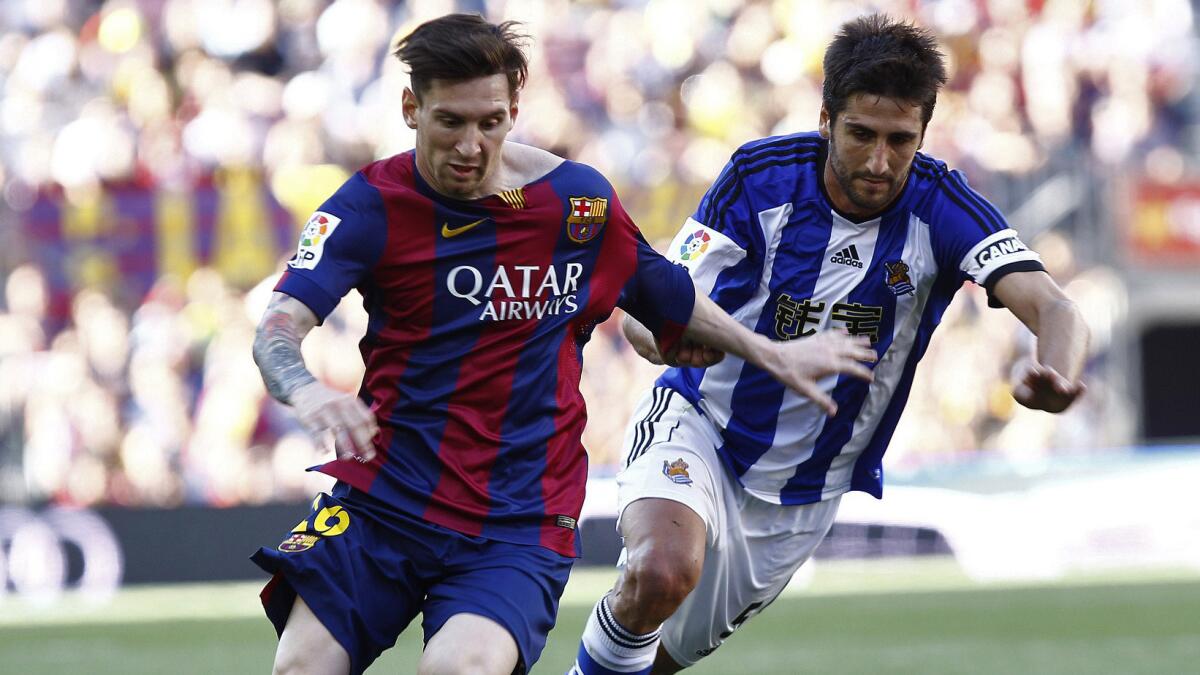Television-deal crisis could endanger Spanish soccer league

Barcelona’s Lionel Messi, left, controls the ball ahead of Real Sociedad’s Markel Bergara during a match on Saturday. Spanish soccer’s players’ union is threatening to strike over a proposed law that would change the way TV revenues will be distributed.
- Share via
If Real Madrid and Barcelona both get through the second legs of their semifinal series this week, they will advance to next month’s Champions League final, making it the tournament’s second all-Spanish championship game in as many years.
But the feud between the two cities and their clubs runs much deeper than supremacy in Spain’s La Liga, the European-wide Champions League or even the personal battle between Madrid’s Cristiano Ronaldo and Barcelona’s Lionel Messi.
It’s the monarchy vs. Catalonia. The Nationalists vs. the Republicans. The Spanish language vs. Catalan.
Yet it might be only the second-biggest rivalry in Spanish sport these days. Last week the country’s soccer federation (RFEF) and its players’ union promised to shut down Spanish soccer beginning May 16 over a proposed law that would change the way TV revenues will be distributed.
La Liga, Spain’s first-division league, immediately took legal action to prevent the strike, which would effectively end the season two weeks early and wipe out this month’s Copa del Rey final between Barcelona and Athletic Bilbao.
Lower-tier league play would also be affected by a strike, with RFEF saying more than 600,000 athletes and 30,000 matches could be impacted. So it wasn’t long before the dispute got personal.
Javier Tebas, president of La Liga, said in a news conference that the threatened walkout was part of a vendetta on the part of RFEF President Angel Maria Villar against Miguel Cardenal, president of the Spanish government’s higher sports council.
“The federation has no power to change any schedules,” said Tebas, who has scheduled an “extraordinary” league meeting Monday to discuss the matter. “It’s an insane, audacious and irresponsible act…. We won’t bow to the federation’s blackmail.”
What makes the standoff truly bizarre is the fact most people involved in Spanish soccer agree with much of the new law — one clubs have been advocating for years.
Under the current setup, Spanish teams have been free to negotiate their own TV deals, and as a result Real Madrid and Barcelona — the two most valuable clubs in the world, according to Forbes — pocket about $158 million in broadcast revenue apiece, more than three times what the next-best team gets. The new legislation, signed off on by Spain’s cabinet last month and awaiting approval by parliament, would centralize the sale of TV rights beginning with the 2016-17 season while dividing revenue among the 42 first- and second-division teams.
“We are in favor of the collective sale of the TV rights. But not the new law as it is,” said Luis Rubiales, the union president who appeared at his own news conference alongside dozens of players including Barcelona midfielder Xavi Hernandez and Real Madrid goalkeeper Iker Casillas.
Despite that show of solidarity, though, it was unclear Saturday whether the RFEF really intended to exercise the nuclear option and strike or whether the saber-rattling was simply intended to give it influence in how the new law is implemented.
The RFEF, which runs soccer in Spain but does not control the country’s top two divisions, said it wants more TV money filtered down to the lower divisions. And the federation would also like to see other revenue, such as money generated by state-run betting, included in the redistribution.
Backed by the union, the RFEF charged the government with a “lack of respect” for not consulting with it on the proposed legislation. The country’s soccer fans’ federation — they really have one of those in Spain — also sided with the union, but issued a statement of its own calling on the players to clarify their intentions.
“Everyone in football has the right to know the reasons why footballers are using such a harsh measure whose consequences will be suffered by thousands of people who love the sport,” the statement said.
Hundreds of millions of dollars also are at stake — not including the $56 million the league says it will lose for each canceled match day. Tebas has argued the proposed legislation will increase his leverage in negotiating a broadcast contract similar to the one the English Premier League recently struck. That deal will pay the EPL more than $7 billion for domestic rights alone between 2016-18.
Plus if the players walk, it would bring a premature and unsatisfying end to tight races for both the league title and the Golden Boot award. With two games left, Messi’s Barcelona leads Ronaldo’s Real Madrid by four points while in the scoring race Ronaldo leads Messi by two goals with 42.
The domestic squabble won’t affect the Champions League however, where Spain’s top rivalry would continue if both teams get through this week’s challenges. Real Madrid returns home trailing Italy’s Juventus 2-1 in aggregate goals in its series. But that away score — by Ronaldo, his 76th in Champions League play — means the defending champions can advance to the final with nothing more than a 1-0 win Wednesday.
History is against Madrid, though, since the team failed to overcome a first-leg deficit in seven previous European Cup semifinals.
Barcelona should have an easier time of it Tuesday at Bayern Munich after a 3-0 first-leg win punctuated by a pair of goals by Messi, giving him a record 77 in Champions League play. Bayern has been pushed to the brink of elimination before, needing a win over Shakhtar Donetsk in the round of 16 and a two-goal victory over Porto in the quarterfinals to stay alive.
The German champions won both those games at home by a combined 13-1.
Twitter: @kbaxter11
More to Read
Go beyond the scoreboard
Get the latest on L.A.'s teams in the daily Sports Report newsletter.
You may occasionally receive promotional content from the Los Angeles Times.









